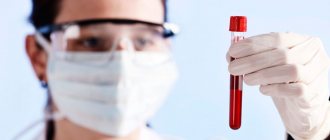Certain types of cancer lead to characteristic changes throughout the body, including at the molecular level. Such changes can be detected using relatively simple laboratory tests for tumor markers. With certain malignant tumors, an increase in one or another indicator is observed. In particular, carbohydrate antigen 125 (or CA-125) makes it possible to suspect ovarian cancer and some other oncological pathology, as well as monitor the patient’s condition after treatment has already been carried out.
Detailed description of the study
CA 125 is a protein that is found on tumor cells of the ovarian epithelium and normally in cells of the endometrium, peritoneum, pleura, pericardium and testicles. It enters the bloodstream, for example, during menstruation, endometriosis, and in the first trimester of pregnancy. The presence of CA 125 does not always indicate an oncological process - small amounts of the protein are produced by various tissues of the body, as well as malignant tumors of other etiologies (endometrium, gastrointestinal tract, fallopian tubes, lungs and gastrointestinal tract). Increased levels of CA 125 in the blood may be associated with pelvic inflammation.
A test for the CA 125 antigen allows you to detect malignant neoplasms of the ovaries or mammary gland at the earliest stage, when changes in the body are minimal and the chances of recovery are highest. It also helps to detect metastases before the onset of clinical manifestations.
Indications
Most often, a referral to test CA-125 levels is given by an oncologist or gynecologist.
An antigen test is recommended in the following cases:
- for suspected ovarian cancer
- assessment of the risk of recurrence or metastasis of serous ovarian cancer after therapy;
- control of endometriosis treatment;
- an additional marker in the diagnosis of adenocarcinoma of the pancreas, gastrointestinal tract and others (bronchi, kidneys, testes, mammary glands, etc.).
Most often, CA-125 is used to monitor the recurrence of an ovarian tumor: an increase in the level of CA-125 (even in the absence of clinical and radiological evidence of relapse) indicates a biochemical relapse of the tumor, which is ahead of the clinical one by 2-6 months.
In clinical studies, CA-125 has proven to be a reliable marker for monitoring patients with B-cell non-Hodgkin lymphoma.
References
- TUMOR MARKERS IN BREAST CANCER V.F. Semiglazov, corresponding member of the Russian Academy of Medical Sciences, Doctor of Medical Sciences, Professor V.V. Semiglazov, Doctor of Medical Sciences, Professor G. Dashyan, Candidate of Medical Sciences A. Bessonov, R. Paltuev, Candidate of Medical Sciences, T. Semiglazova, Candidate of Medical Sciences, I. Grechukhina, K. Penkov, A. Vasiliev, A. Manikhas - Candidate of Medical Sciences, Research Institute of Oncology named after. N.N.Petrova, St. Petersburg State Medical University named after. acad. I.P. Pavlova, City Clinical Oncology Dispensary St. Petersburg.
- Baselga J., Tripathy D., Mendelsohn J. et al. Phase II study of weekly intravenous recombinant humanized anti-p185HER2 monoclonal antibody in patients with HER2/neu-overexpressing metastatic breast cancer // J. Clin. Oncol. – 1996; 14: 737–744.
- CobleighM., Vogel C., Tripathy D. et al. Multinational study of the efficacy and safety of humanized anti-HER2 monoclonal antibody in women who have HER2 -overexpressing metastatic breast cancer that has progressed after chemotherapy for metastatic disease // J. Clin. Oncol. – 1999; 17:2639–2648
SA-125 is normal
Important! Standards may vary depending on the reagents and equipment used in each particular laboratory. That is why, when interpreting the results, it is necessary to use the standards adopted in the laboratory where the analysis was carried out. You also need to pay attention to the units of measurement. Normal tumor marker values
| Women | Men | |
| before menopause | less than 35 U/ml | up to 10 U/ml |
| in menopause | less than 20 U/ml | |
| during pregnancy | up to 100 U/ml (extremely rare) | |
Factors of influence
Distort the result of the study, i.e. The following reasons may show a false positive result:
- intensive drug therapy;
- pregnancy;
- menstruation and cycle disorders;
- chronic stress;
- violation of the rules for taking a test or drawing blood.
What are tumor markers
Tumor markers are specific biomolecules produced by pathologically altered cancer cells. More often they are protein compounds, but can have a different nature: enzymatic, hormonal or receptor. Most of these markers are also synthesized by healthy cells of the body, but in much smaller quantities.
The term “tumor marker” was first introduced in the 60s of the last century by domestic scientists Harry Abelev and Lev Zilber. While conducting research, they discovered that an increase in the AFP protein produced by the placenta during pregnancy is characteristic of malignant liver tumors. This marker was the first to be included in clinical practice in tumor research.
Today, more than two hundred types of specific compounds have been identified, but only about twenty are subject to analysis.
Markers are found in various biofluids at the initial stages of the formation of malignant cells, in the preclinical (asymptomatic) stage of tumor formation. Connections are divided into two types. Markers of high specificity are highly likely to identify a specific disease, while markers of low specificity are characteristic of a number of different pathologies.
Based on the probable location of the tumor, experts identify tumor markers:
- mammary gland;
- testes;
- Bladder;
- pancreas;
- liver;
- esophagus;
- stomach;
- thyroid gland;
- lungs;
- skin;
- prostate gland;
- ovaries;
- uterus;
- intestines.
Doctors are ambivalent about this classification. This is due to the fact that no ideal marker has been identified to date. None of them has 100% specificity, allowing one to unambiguously identify cancer of a specific organ.
What tumor markers should women take?
Gynecological cancer kills millions of women every year.
The first symptoms of the disease appear quite early, but women either do not pay attention to them or are embarrassed to see a doctor.
Female tumor markers make it possible to diagnose oncopathology of the female genital organs without additional research methods.
Types of cancer in women
Women have to face cancer of the cervix and uterine body, ovaries and breast.
All women's diseases, which are based on the cancer process, have ten common signs that allow one to suspect oncological pathology in the early stages:
- there is bloody or bloody discharge;
- uterine bleeding (metrorrhagia) appears;
- menstruation becomes painful and irregular (algodysmenorrhea);
- the size of the abdomen changes;
- discharge from the mammary glands begins;
- lumps appear in the mammary glands;
- unmotivated fatigue and increased fatigue appear;
- a woman loses weight;
- bothered by abdominal pain;
- an unexplained fever develops.
Uterine cancer develops due to:
- early onset of sexual activity,
- smoking,
- untreated precancerous diseases, etc.
Women suffer from adenocarcinoma (glandular cancer) of the cervix and cervical canal, as well as squamous cell cancer of the cervix.
Women are rarely diagnosed with uterine sarcoma.
Tumor markers for women are a good help in the early diagnosis of uterine cancer.
Ovarian cancer mainly affects women over fifty years of age.
The peculiarity of this type of cancer is that the first signs of the disease appear when the tumor reaches a large size and puts pressure on surrounding organs.
Women appear
- nagging pain in the lower back,
- severe pain after intercourse and
- signs of anemia.
Determining the level of female tumor markers allows for timely detection of oncological alertness.
The first manifestations of female breast cancer can be detected during examination.
This is a change in the shape of the mammary gland, deformation of the nipple, and the presence of discharge from it.
Changes in the skin in a certain area of the gland (the skin resembles a lemon peel) and the appearance of dense tuberous nodes in the thickness of the mammary gland.
With such symptoms, a woman should immediately consult a doctor and donate blood for tumor markers.
What tumor markers should women take?
The female body produces hormones, the level of which can increase with genital cancer.
In addition, with genital cancer, organ-specific tumor markers appear in a woman’s body, which make it possible to suspect cancer of the uterus or appendages.
If a woman is suspected of having cancer of the internal genital organs, the following tumor markers are determined:
- cancer antigen 125;
- beta human chorionic gonadotropin;
- carcinoma embryonal antigen;
- tumor marker 27-29;
- squamous cell carcinoma marker SCC;
- estradiol
Cancer antigen CA-125
is a glycoprotein that is present in serous membranes and tissues.
The source of CA-125 in women of reproductive age is the endometrium. This is associated with a cyclic change in the concentration of CA-125 in the blood in different phases of the menstrual cycle.
During menstruation, the tumor marker CA-125 is produced in increased quantities.
During pregnancy, the tumor marker CA-125 can be detected in the placenta extract, amniotic fluid (from 16 to 20 weeks) and in the blood serum of the pregnant woman (in the first trimester).
Beta human chorionic gonadotropin
human is produced by the placenta of a pregnant woman. Its β-subunit is of diagnostic value, the concentration of which is used to judge the course of pregnancy. If the level of β-chorionic gonadotropin increases in the blood of a non-pregnant woman, then this clearly indicates a tumor process in her body.
Tumor marker CA 27-29
is the only tumor marker that is considered absolutely organ-specific for the mammary gland.
It is a soluble form of the MUC1 glycoprotein. This glycoprotein is expressed on the cell walls of breast carcinoma. It is produced in excess in endometriosis and female genital cancer.
Tumor marker SCC
is a tumor marker for squamous cell carcinoma. This is a protein that is produced by epithelial cells of the cervix, skin, bronchi, and esophagus.
Estradiol
is a specific marker (estrogen hormone), which is always detected in the blood of both women and men.
The functioning of many organs and systems of the female body depends on its level. Its concentration in the blood increases during pregnancy and many women's diseases. However, a sharp increase in the amount of estradiol may also indicate ovarian cancer.
Indications for testing for tumor markers
Women's health depends on whether it is monitored with cancer cell markers in a timely manner.
Examination of a woman with tumor markers is indicated in the following cases:
- for diagnosing cancer of the genitals and mammary glands;
- for the purpose of screening the radicality of tumor removal during surgery;
- to monitor the effectiveness of ongoing antitumor therapy;
- in order to predict the course of the disease and the likelihood of tumor recurrence.
- in the follicular phase from 68 to 1269 pmol/l;
- the ovulatory peak is in the range of 131-1655 pmol/l;
- in the luteal phase from 91 to 861 pmol/l.
Interpretation of study results for tumor markers and tumor marker norms
Interpretation of the results of analysis for tumor markers should be carried out in the laboratory where the study was performed.
The norm of indicators depends on the analysis technique.
We offer the most accepted interference indicators of tumor marker levels.
Reference values for the tumor marker CA-125 in women in blood serum are up to 35 IU/ml; during pregnancy, its concentration can increase to 100 IU/ml.
The normal hCG level in non-pregnant women is 6.15 mU/L. For non-pregnant women, the free β-subunit of hCG in venous blood is up to 0.013 mIU/ml.
In healthy people, the CEA level rarely exceeds 3 ng/ml, but can sometimes reach 5-10 ng/ml in the case of benign diseases, 7-10 ng/ml in patients suffering from alcoholism and up to 10-20 ng/ml in smokers.
In patients with localized cancer, the concentration of CEA increases in 25% of cases. If women have metastases, the CEA tumor marker will be elevated in 60-80% of cases.
Exorbitant initial concentrations of CEA on the eve of surgical treatment may indicate metastasis of a malignant tumor to regional lymph nodes.
A persistent increase in tumor marker levels indicates that there is no adequate response to therapy.
An increased level of the tumor marker CEA indicates the likelihood of relapse of the disease several months before the appearance of the first clinical signs.
The normal level of breast tumor markers CA 27-29 is less than 38-40 U/ml.
In an adult patient, the concentration of the tumor marker AFP should not exceed 20 ng/ml. Also, a CA level of 27-29 above 10,000 ng/ml may portend an unfavorable outcome of the disease.
The upper limit of normal for the SCC tumor marker (discriminatory level) is 1.5 ng/ml.
The normal concentration of estradiol in a non-pregnant woman is considered to be 40-161 pmol/l.
Its level depends on the phase of the cycle:
In postmenopausal women, estradiol levels should not exceed 73 pmol/l. If this hormone is detected in concentrations exceeding the interference values, one should think about cancer of the female genital organs.
Where can you get tested and how to prepare for them?
Tests for tumor markers can be taken at the Polyclinic of Innovative Technologies LLC.
On the eve of the test, a woman should rest well, stop taking medications and not smoke.
Drinking alcohol is also contraindicated.
You can eat food eight hours before donating blood for testing.
Blood is taken from the cubital vein after the woman has rested for fifteen minutes. It is desirable that she be in a state of complete psychological peace. Analyzes must indicate reference values.
It will also be important for the doctor to know what method was used to conduct the study.
If you are faced with the problem of female cancer pathology, contact your obstetrician-gynecologist immediately.
Diagnosis in the early stages of the disease can be made after determining the level of tumor markers.
Early diagnosis of cancer of the female reproductive system is the key to successful treatment of the disease.
This article is for informational purposes only. An obstetrician-gynecologist at our Polyclinic can tell you in more detail about the prevention of diabetes.
The Polyclinic of Innovative Technologies LLC has developed a special program for the early detection of diseases, including cancer in women
, diagnostics are available to the population of all ages, you MUST undergo it and you will get rid of the “mass” of problems in your body.
In your free time, call him by phone: call center 8 (495) 356 3003.
LLC "Innovative Technologies" thanks you for
that you took the time to read this information.
Why do blood tests for tumor markers?
Analysis for tumor markers is often used as an evaluative test to determine positive (or negative) dynamics in cancer therapy. Based on its results, relapse can be prevented.
Markers allow you to:
- confirm or refute the assumptions of preliminary diagnostics;
- notice the formation of metastases in the absence of other symptoms;
- evaluate the effectiveness of the prescribed therapeutic course.
The study is not recommended as an independent diagnosis due to the large number of false positive (false negative) results. But, in combination with other methods, it helps to identify cancer at an early stage.
How to donate blood for tumor markers
The attending physician should give specific recommendations on restrictions before blood collection. They depend on which specific protein will be studied.
The general rules are as follows:
- donate blood at least 8 hours after your last meal;
- try not to be nervous during the procedure;
- interrupt serious training for a week;
- stop drinking alcohol three days before;
- It is advisable not to smoke immediately before collecting biomaterial;
- If in the next week the patient underwent x-rays or other examinations, the doctor must be informed about this.
Other requirements may need to be met. Thus, if you suspect a prostate tumor, it is advisable to abstain from sexual intercourse for 7 days; it is better not to test blood for tumor markers of the female reproductive system during menstruation.
3.What are the risks and what may affect the analysis?
What are the risks of the CA-125 blood test?
Possible risks of the cancer antigen test may only be associated with the blood draw itself. In particular, the appearance of bruises at the puncture site and inflammation of the vein (phlebitis). Warm compresses several times a day will relieve phlebitis. If you are taking blood thinning medications, you may bleed at the puncture site.
What could affect the analysis?
CA-125 cancer antigen levels may change due to:
- Taking anticancer drugs;
- Recent examination using radiation;
- Previous abdominal surgery. The CA-125 test is done only 3 weeks after surgery.
About our clinic Chistye Prudy metro station Medintercom page!
Where can I get tested for tumor markers?
You can get tested for tumor markers free of charge (with compulsory medical insurance and a referral from a therapist or oncologist) at the clinic. The result is usually ready within a day. However, not all medical institutions have the necessary equipment.
You can undergo examination in diagnostic centers or private clinics, but you should not decide on your own whether it is necessary. You should donate blood only as prescribed by your doctor. The specialist will give an adequate assessment of the patient’s condition and select the most specific compounds for a particular case. Research on all groups of tumor markers is meaningless. Plus it's not cheap. Prices range from 300 to 2000 rubles for each substance, depending on the region and clinic.
Tumor markers are effective indicators of tracking tumor response to patient therapy. As a method of initial detection of oncological pathologies, they do not guarantee an accurate result. By analyzing specific proteins, one can suspect the presence of cancer cells and other dangerous diseases. An oncologist should decipher the received data. Self-diagnosis often leads to erroneous conclusions, incorrect treatment and serious health consequences.
Indications for tumor marker analysis
During the period of active growth, cancer tissue absorbs nutrients and releases breakdown products, many of which are toxic. These processes affect human health, causing characteristic symptoms.
Any history taking begins with interviewing the patient. Doctors may be alert to the following changes in your health:
- a sharp decrease in body weight for no apparent reason;
- increased fatigue;
- refusal of food;
- constant or recurrent pain;
- frequent weakness;
- low-grade body temperature (from 37.1 to 38.0 °C for a long time).
Oncological pathology is also reflected in the results of standard blood tests. A general analysis can reveal an increase in ESR, a decrease in leukocytes or hemoglobin. Negative changes are also noted in the “biochemistry” of the blood.
Malignant neoplasms are characterized by a decrease in protein content, acceleration of blood clotting, and an increase in ESR.
Such research results in themselves do not indicate the growth of pathologically altered cells, but are a reason for additional examination. Including testing for tumor markers.
Exceptions are people from risk groups who are recommended to undergo this procedure regularly.
These include patients:
- with a hereditary predisposition (if cancer was diagnosed in relatives up to the second generation);
- upon returning from places of man-made disasters;
- survivors of significant intoxication;
- in the presence of benign tumors;
- living in settlements with poor ecology.
For men over 50 years of age, it is advisable to do a PSA test annually to timely detect changes in the activity of the prostate gland. The analysis is also indicated for those who have already been diagnosed with cancer. Studies are prescribed not only to patients undergoing treatment, but also to those who have been successfully cured. This allows you to stop possible relapses of the disease. Preliminary preparation of a person for analysis increases the likelihood of obtaining an accurate result.
Increase SA-125
Important! The interpretation of the results is always carried out comprehensively. It is impossible to make an accurate diagnosis based on only one analysis.
Increase to 45 U/ml
A slight increase in CA-125 occurs in diseases involving the serous membranes:
- pleurisy;
- peritonitis;
- pericarditis.
Increase to 65 U/ml
In the presence of a benign ovarian neoplasm, the rate can normally increase to 60 U/ml, which is associated with the destruction of epithelial tissue. In this case, the level of CA 125 should be regularly monitored (in order to assess the risk of tumor malignancy), especially in women in menopause.
- benign gynecological tumors (for example, fibroids);
- inflammatory processes involving the appendages (adnexitis);
- endometriosis.
Increase to 100 U/ml
An increase in CA-125 to 100 U/ml or higher indicates the risk of developing a malignant process and the need for additional research, including a test for the HE4 tumor marker.
- Ovarian carcinoma;
- Adenocarcinoma of the cervix;
- Endometrial cancer;
- Cancer of other internal organs, including in males.
The level of CA 125 can correlate with the level of natriuretic hormone, so the severity of heart failure is determined based on the test results.









